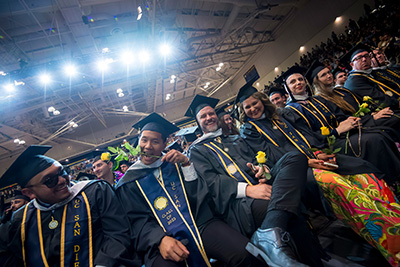Jacobs School of Engineering Launches Two New Master’s Specializations for Working Professionals
The newly expanded systems engineering master’s program for working professionals focuses on Cyber-Physical Social Systems and Value Supply Chains.
Story by:
Published Date
Article Content
The University of California San Diego Jacobs School of Engineering is launching two new master’s degree specializations designed for working professionals.The two new specializations are an expansion of the systems engineering master’s, focused on the systems engineering of Cyber-Physical Social Systems and Value Supply Chains. Both are part-time, with courses beginning in the fall of 2024. Applications are now open.
These new specializations in Cyber-Physical Social Systems and Value Supply Chains both grew out of the Jacobs School of Engineering’s highly regarded, and well-established, Architecture-Based Enterprise Systems Engineering (AESE) master’s degree program. The popular AESE curriculum focuses on the enterprise as a system. The AESE program is designed for senior engineers, engineering managers, and technical professionals interested in moving into leadership positions within their organization.
Together, the three specializations cover the entire system’s engineering spectrum, from products and service, to the enterprise, and on to the global supply chains. The existing AESE program is focused on a single enterprise as a system. The Value Supply Chain program focuses on networks of enterprises, or systems-of-systems. The Cyber- Physical Social Systems specialization applies systems engineering principles to the product or service itself.
The expanded program will be named Convergent Systems Engineering (CoSE) to emphasize the broadened scope. In addition, this expansion both strengthens the offering in each specialization, and has provided an opportunity to evolve the entire program to capitalize on the growing importance of artificial intelligence and machine learning, across all system scales. Working professionals in all three programs will earn a master’s degree in Convergent Systems Engineering with a specialization in their particular area. The focus of the AESE program will remain unchanged.
“Systems Engineering education is challenged to address the technical leadership needs posed by rapidly changing technology epitomized by Industry 4.0, digital transformation and the rapid advances of AI/ML,” said Jon Wade, faculty director of the Convergent Systems Engineering program at the UC San Diego Jacobs School of Engineering. “These challenges are happening at all scales, so it has become evident that a systems engineering graduate program needs to provide the foundational skills for systems engineers to be successful in each of these, while providing the context of application in the system scale of interest. This is convergent systems engineering. We have used the same approach in the design of this program to foster collective learning through iterative rapid integration and testing in real world scenarios, at all scales, to support the ability to create ethically sustainable systems solutions.”

This expansion of the popular AESE program results in a diverse set of systems engineering degree specializations that allow working professionals to focus their efforts at the product or services; the enterprise; or the global supply chain system-of-systems level. In particular:
- The Cyber-Physical Social Systems specialization is focused on the engineering of systems that integrate computing, physical assets, and human networks over the lifecycle of a product or service from concept to deployment and evolution. While systems are often described as things that people use, many complex systems, such as an aircraft, the smart grid, smart cities, or even internet applications are a combination of computers, machines and people all working together to achieve the larger goals that define the system.
- The AESE curriculum is focused on approaches that can enable their enterprises to better respond to the challenges of globally distributed operations in complex, highly dynamic, event-driven environments. The program guides professionals to respond and adapt to their enterprise in timely, innovative and effective means, addressing the challenges and issues that arise when an enterprise is attempting to develop and evolve its Enterprise Knowledge System.
- The Value Supply Chain specialization is concerned with supply chains which are the connective tissue of the global economy. Robust supply chains are the source of much of the innovation that enables economic stability and growth. Ultimately, supply chains determine the economic, social, and environmental sustainability of engineered systems. There has been growing industrial demand for engineers who can understand, design and manage complex end-to-end supply chains.
All students in these three master’s programs organized within the Convergent Systems Engineering degree will take the same five core courses, plus four courses within their specialization, and then a final capstone team project. The capstone project is threaded throughout the entire program, and is used as real world context for each course. Often, these projects are based on a team’s relevant workplace scenario.
Students in all three of these master’s specializations will learn how to create cognitive models to visualize, intuit, and innovate complex systems, and how to orchestrate and rapidly integrate new, complex components. They will learn about iterative and agile engineering design. Students in the program will also practice business, leadership, ethics, and teaming skills as they work together on practical systems projects.
“The main impetus for starting these new specializations was feedback we received from our corporate affiliates,” said Gary Henderson, director of the Master of Advanced Study program at the UC San Diego Jacobs School of Engineering. “We did a large study to identify curriculum gaps in systems engineering education, and saw that there was a need for engineering leadership education focused on systems-of-systems, as well as products and services. We’ve seen the success and the popularity of our AESE program over the last 15 years, so we believe we’re in a good spot to expand that curriculum.”
Master’s Degrees in Engineering for Working Professionals
These rigorous and sought-after master’s degrees for working professionals from the UC San Diego Jacobs School of Engineering are officially called Master of Advanced Study (MAS) degrees. MAS programs are engineering master's programs tailored to the needs of working engineering professionals, guided by industry needs.
These highly regarded master’s degree programs offer a solution in executive education that allows technical professionals to continue working while they earn their master's via an in-class academic environment with world-class faculty, facilities, resources, and networking. The curricula for the Cyber-Physical Social Systems and Value Supply Chain specializations are designed to be inclusive, and are a good fit for younger working professionals with a year or two of experience, as well as for engineers with more working experience. The Convergent Systems Engineering Master’s programs join the Jacobs School’s sought-after MAS degrees in Data Science and Engineering, and in Wireless Embedded Systems.
The AESE specialization is a one year program with in-person courses every other Friday and Saturday plus a four-day workshop each quarter. The Value Supply Chain and Cyber-Physical Systems specialties are effectively part time programs, with the same course load distributed over two years rather than one.
“I’m thrilled that we are launching an expanded set of master’s programs focused on systems engineering at multiple scales. This comprehensive approach to systems engineering addresses critical industrial and societal needs. Here at the UC San Diego Jacobs School of Engineering, we prioritize building relevant education, research and entrepreneurship programs that directly benefit humanity. These new programs in Convergent Systems Engineering are absolutely part of our mission,” said Albert P. Pisano, Dean of the UC San Diego Jacobs School of Engineering.
Share This:
You May Also Like
Stay in the Know
Keep up with all the latest from UC San Diego. Subscribe to the newsletter today.




